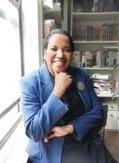Just Do What Justice Sonia Sotomayor Did – By Marcia Cantarella, Ph.D.
May 14, 2013 Leave a comment
Reprinted by permission from the Huffington Post

Marcia Cantarella, Ph.D.
Having been a dean at Princeton, and also having had the privilege of meeting Justice Sotomayor, I was delighted to read an interview with her in the Princeton alumni magazine. By now all know that she was a child of the Bronx, did not grow up in a family of means, and struggled to achieve what she has along the way. I have many friends who were among the first women at Princeton and also some who were like Justice Sotomayor, minorities among that minority of women. The challenges that they have described — especially those who were also ethnic minorities and low-income — mirror the challenges described now by far more students across all kinds of schools and not just the halls of the Ivy League. Many of these students do not make it through college at all. Justice Sotomayor’s interview has lessons that are as applicable today as when she was a freshman.
She talks about how she felt different more for her poverty than her gender or ethnicity, but that any of those factors could have made her feel like an outsider. I have found over the years that students feel difference keenly and that often they feel difference where it does not exist. All freshmen feel that the kid next to them is smarter (or cuter, or cooler…). The need to belong is strongest during adolescence and we sometimes forget that college students are still that. I do not want to minimize what she felt. Indeed the reality of her sense of difference made it more difficult to navigate. And that is pretty typical for those in her circumstances. It is one of the reasons that talented students from backgrounds like hers do not even try to get into places like Princeton. They, with some reason, realize that they will be different from their more affluent classmates and will lack aspects of cultural and other exposure those classmates may have.
Sotomayor’s solution is one I have long recommended. Find a community that resonates with your own experience. It may be an ethnic club or organization. For her it was Princeton’s Third World Center. For young men in CUNY or other schools, it may be a Black Male Initiative. For some students it is a religious group on campus. It may be one with a vocational focus like the pre-med or pre-law societies. These can provide a comfort zone and safe space where there are people who understand you. One young man I know is very much the geeky science nerd who felt that not only did no one “get him” but as a black male he was even more adrift. A science enrichment program for students of color gave him exactly what he needed to feel he belonged somewhere and could navigate the campus from that base. And that is the important thing. Sotomayor says not to limit yourself to that one group, but to use it to become more comfortable in the larger community and then to engage with it as well.
She speaks to the importance of ultimately taking the risk of being part of a larger community and taking part in clubs and activities that are new. These provide the networks needed for success but also a comfort level with all kinds of people. You get stronger when you take these kinds of risks and get beyond your comfort zone. Your world becomes larger and your life richer and your opportunities greater. But she also says it is important to keep close to your roots and to bring your family and community along with you. You can enrich their lives by sharing your own. I have known many immigrant students who bring to their families a whole new world view, introductions to new friends and broader cultural exposure as a result of their college experience.
Sotomayor also speaks of the vital importance of finding someone to talk to. In her case it was a faculty member. As a dean I have been that person for many students on the campuses where I have served. It may be a coach or an adviser. Just find someone that you can ask questions of — especially the ones that you think may be “stupid” or which may label you as an outsider. The reality is that any new student feels like an outsider but no one wants to admit to it. But not asking questions or for help is actually dangerous. It is also counter to the culture of college which is all about inquiry.
She says she found her mentor’s advice to start gradually and take basic courses before advanced ones served her well and gave her the good grounding she needed. She also was advised to take subjects new to her (economics and sociology) that ended up being vital to her work later in ways she would never have imagined. Finding someone to guide and advise her and taking that advice to heart has been key to her success and began in college.
I have heard her messages from others who have also achieved to a far greater degree than they ever imagined. Some I know from personal knowledge and some from media interviews. But the themes are the same. Take the risk, find the allies, seek support. It works over and over. Try. Just do what Justice Sotomayor did.
